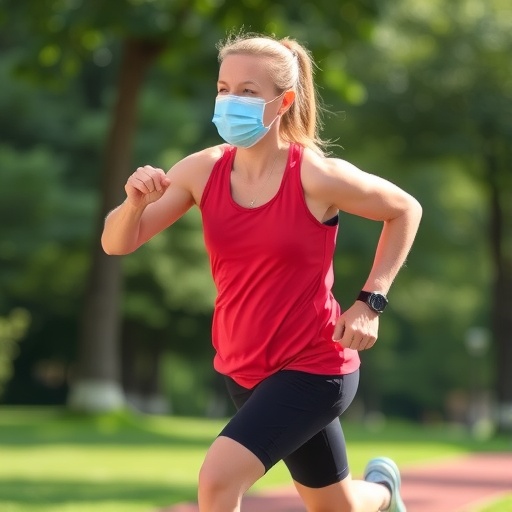A groundbreaking randomized controlled trial presented at the European Respiratory Society Congress in Amsterdam unveils compelling evidence that structured exercise can significantly recalibrate immune function in individuals suffering from post-COVID syndrome. This study, led by Professor Nicolette Bishop and presented by Dr. Enya Daynes from Loughborough University, delves into the intricate immunological disruptions induced by long COVID and explores how targeted physical rehabilitation can restore immune homeostasis, promising a path toward improved patient outcomes.
Post-COVID syndrome, also referred to as long COVID, encompasses a constellation of persistent and debilitating symptoms such as profound fatigue, myalgia, arthralgia, and general malaise, which manifest following acute SARS-CoV-2 infection. These symptoms are increasingly understood to stem from immune dysregulation, wherein the immune system exhibits hyperactivity or aberrant targeting of host tissues. Dr. Daynes articulates that in this maladaptive response, immune cells may erroneously attack healthy cells or mount disproportionate reactions to benign stimuli, engendering chronic systemic inflammation that underpins the clinical symptomatology of post-COVID syndrome.
The clinical trial enrolled 31 patients who had been hospitalized for COVID-19 and subsequently diagnosed with post-COVID syndrome. Participants were randomized into two groups: one cohort engaged in an eight-week, supervised exercise-based rehabilitation program integrating treadmill walking, cycling, and strength training; the other received standard medical care without structured physical activity. This methodological design enabled a rigorous comparison of immune parameters between physically rehabilitated patients and controls, establishing a causal relationship between exercise and immune modulation post-COVID.
Immunophenotyping analyses revealed that patients who underwent the exercise intervention exhibited marked enhancements in the population of naïve immune cells. These cells play a pivotal role in recognizing novel pathogens and initiating adaptive immune responses. Moreover, there was a notable increase in central memory CD4+ T cells among the exercisers, cells that are crucial for rapid and robust responses upon re-exposure to previously encountered antigens, including SARS-CoV-2. This shift towards a more functional memory T cell repertoire indicates a restored capacity for effective immune surveillance and response.
Further immunological improvements were detected in central and effector memory CD8+ T cells. These cytotoxic lymphocytes are responsible for targeting and eliminating infected cells swiftly upon recognition of viral antigens. The augmentation of both central and effector memory subsets suggests that exercise not only bolsters immediate effector responses but also enhances long-term immunological memory, which is essential for protection against reinfection. Such findings underscore the systemic benefits of exercise-mediated immunomodulation in post-COVID convalescents.
Mechanistically, Dr. Daynes hypothesizes that exercise facilitates these immune improvements through multiple physiological pathways. Enhanced cardiovascular function resulting from exercise increases blood flow and shear stress, promoting the mobilization and circulation of immune cells. The biomechanical stimuli also encourage immune cells to traverse vascular and lymphatic tissues more efficiently, enhancing their ability to detect and respond to pathogens. Additionally, exercise-induced modulation of cytokine profiles may reduce chronic inflammation and foster an immunological environment conducive to tissue repair and homeostasis.
Beyond improved immune cell distribution and function, exercise is posited to enhance intercellular communication within the immune system. This facilitates refined coordination of innate and adaptive immune responses, crucial for resolving chronic inflammation without exacerbating tissue damage. The increased turnover and production of immune cells stimulated by physical activity also replenish the immune repertoire, replacing exhausted or dysfunctional cells with newly generated ones that restore the balance between pro-inflammatory and regulatory elements.
The significance of this research extends beyond biomolecular insights to tangible clinical implications. Post-COVID syndrome affects individuals across age groups and can severely impair quality of life by limiting capacity for work, study, and routine activities. The rehabilitative exercise program offers an accessible and non-pharmacological intervention that may alleviate persistent symptoms by addressing their immunological root causes. This modality holds promise as an adjunct therapy to conventional symptomatic management, potentially reducing the long-term burden of long COVID.
Importantly, the investigators aim to expand future research to include patients who experienced milder COVID-19 illness not necessitating hospitalization. Determining whether similar immunological and symptomatic benefits of structured exercise manifest in this broader population will be critical for establishing generalized rehabilitation guidelines. The heterogeneity of post-COVID syndrome presentations underscores the need for stratified therapeutic approaches tailored to individual patient profiles and disease severity.
Independent commentary by Dr. Guido Vagheggini, an expert in respiratory clinical care and physiology, highlights the broader clinical relevance of these findings. Dr. Vagheggini emphasizes the pervasive impact of post-COVID syndrome and the urgent need for interventions that restore immune function, thereby reducing symptom burden and mitigating fears of recurrent infections. He applauds this trial’s contribution to understanding the mechanistic underpinnings of exercise-induced immune restoration and its potential role in public health strategies addressing long COVID.
The study’s robust randomized controlled design enhances the validity of its conclusions and sets a precedent for future immunological studies integrating clinical and molecular endpoints in post-infectious syndromes. By bridging the gap between physiology, immunology, and rehabilitation medicine, this work establishes physical exercise as a cornerstone in the multidisciplinary approach needed to tackle the complex sequelae of COVID-19.
As post-COVID syndrome becomes a growing public health challenge, these insights offer hope and direction. Encouraging controlled, supervised exercise regimens could become a standard element in the recovery protocols for patients enduring the protracted effects of COVID-19. This approach aligns with a broader movement to harness lifestyle interventions for immune system optimization and resilience in the face of ongoing viral threats.
In conclusion, the data from Dr. Daynes and colleagues provide compelling evidence that exercise-based rehabilitation exerts significant restorative effects on central and memory T cell populations in post-COVID syndrome patients, mediating improved immune surveillance and function. This novel therapeutic avenue promises to ameliorate symptoms associated with immune dysregulation and enhance long-term immunity against SARS-CoV-2 and other pathogens, marking a milestone in post-COVID clinical care and research.
Subject of Research: People
Article Title: Exercise-Induced Immune Recalibration in Post-COVID Syndrome: A Randomized Controlled Trial
Image Credits: Enya Daynes/ERS
Keywords: COVID 19, Respiratory disorders, Physical exercise




